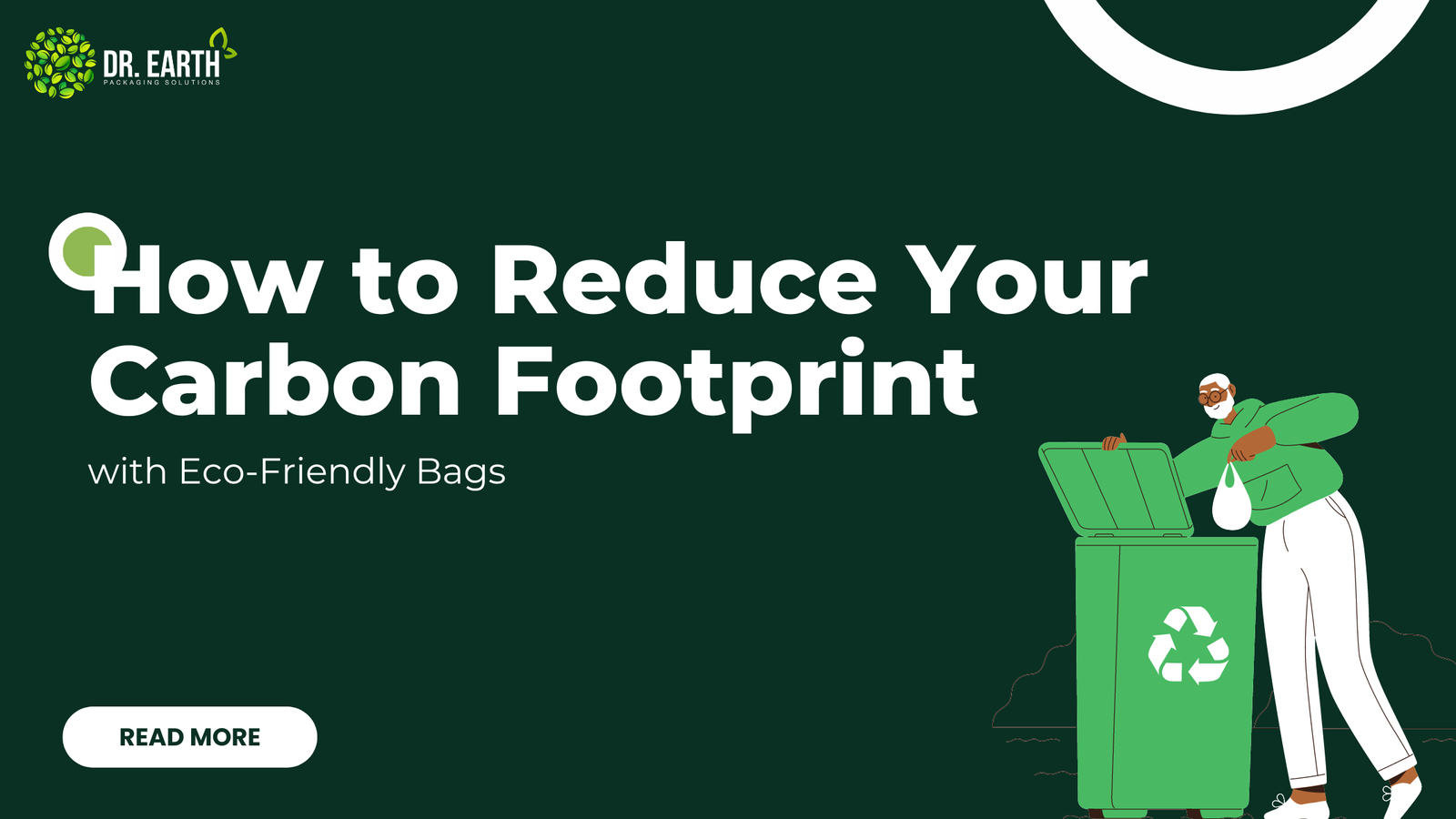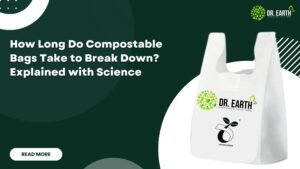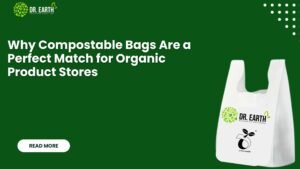
Debating climate change at all international levels has provided a very significant task of reducing carbon footprint in the lives of both individuals and businesses in today’s world. Carbon footprint refers to total greenhouse gases emitted through direct or indirect human activities that contribute to global warming. An effective and one of the simplest methods to reduce this impact is shifting from traditional plastic bags usage to the usage of eco-friendly, biodegradable bags.
Plastic emission is disastrous for our planet. While it chokes up marine life or sits in the landfills of centuries, plastic bagging contributes the most to the degradation of this earth. Companies like Dr. Earth, committed to making compostable and biodegradable bags, give us a better option that can reduce the ill-effects of plastic pollution significantly. Thus, regarding those facts, this blog outlines how, in extreme detail, environmentally friendly bags can help to cut carbon footprints and contribute more to sustainable lives.
What is a Carbon Footprint?
Now that we have armed ourselves with knowledge of what a carbon footprint is, let’s have a look at the benefits of Eco-friendly bags. A carbon footprint is defined as the amount of CO2 and other greenhouse gases released into the atmosphere due to your daily activities. Such emissions originate from a number of sources; these include car driving, electricity consumption, and yes, even the production and use of plastic bags.
If you use the so-called regular plastic bags, it becomes quite a high carbon footprint because the energy used for their production, transport, and disposal is greatly immense. Most plastic bags come from non-renewable resources such as petroleum and natural gas. In addition to releasing those toxic greenhouse gases, such forms of productions cause pollution and resource depletion.
The Role of Plastic Bags in Increasing Your Carbon Footprint
Plastic bags are really notorious for causing damage to the environment. Here’s how they contribute to increasing your carbon footprint:
- Production Emissions
Plastic bags come from petrochemicals that are basically extracted from crude oil and natural gas. Energy is consumed to extract, process, and refine this raw material, which is released into the atmosphere in the form of huge gulps of carbon dioxide and other greenhouse gases. - Transportation
Once plastic bags are made, they have to be moved into different places to distribute them. Transportation is a fuel-consuming activity and contributes to the complete carbon footprint of the product. Moreover, plastic bag production and transportation are undertaken by all parts of the world, and this increases the carbon footprint of the products further. - Decomposition Issues
Plastics especially the plastic bags may take hundreds or thousand years to fully decompose. Over the years as they disintegrate into small parts, they emerge as microplastics while releasing poisonous chemicals in the environment. This pollutant contaminates the sources of land and water, posing long-term threats to the environment.
What Are Eco-Friendly Bags?
Eco-friendly bags are alternatives to the conventional plastic bag. Designing these bags minimizes impact on the environment during all phases of making the bag. Whereas the plastic bag is from non-renewable resources like cotton or jute, it also includes plant-based materials such as cornstarch or potato starch.
Dr. Earth makes bags made from plant-based, biodegradable material that breaks down naturally in the environment. These products exemplify just how switching to eco-friendly measures can better your carbon footprint.
Benefits of Using Eco-Friendly Bags
Adopting eco-friendly bags, such as those made by Dr. Earth, will offer you a plenty of differences in several environmental and personal benefits. Here is how:
1. Lower Carbon Emissions
The other benefits of green bags are that it takes less amount of resources to produce than regular plastic bags. In this regard, Dr. Earth develops compostable bags from plant-based elements. These have origins in plants, including corn starch, which have lesser energy consumptions during their generation processes. This thus leads to fewer carbon footprints due to lesser amounts of fossil fuels consumed during the production processes of fossil fuels being burnt.
2. Use of Renewable Materials
Unlike plastic bags, which are derived from fossil fuels that are nonrenewable, biodegradable bags by Dr. Earth are derived from renewable resources from plants. Their material, including corn starch and potato starch, is the plant kind that can be farmed and collected in a less destructive way toward the environment.
3. Biodegradability and Compostability
One of the best advantages of eco-friendly bags is that they are biodegradable. Biodegradable bags by Dr. Earth will decompose within months, under the conditions right decomposition, whereas plastic takes hundreds of years to decompose. Once they are composted, it transforms into organic matter that enriches the soil without leaving any toxic microplastics or toxins behind.
4. Waste Reduction
Plastic bags are blamed for once clogging landfills and poisoning the oceans. Its recycling is almost impossible, and most of the time, they accumulate as litter. With compostable bags, there is an apparent and clear reduction of waste generation by the consumers. Dr. Earth bags decompose naturally and are not a burden on the waste management; thus, no major pollution occurs.
5. Versatile and Durable
Dr. Earth bags are also eco-friendly and useful for a wide range of purposes that include grocery shopping, carrying items around, and packaging. They are as convenient as plastic bags but do not harm the environment. They are also quite durable so they can be reused a number of times before they have to be composted.
6. Compliance with Environmental Regulations
Many countries and regions now ban or tax single-use plastic bags because of their contribution to environmental problems. You’d be taking that money for fines out of public coffers if you instead use environmentally friendly alternatives such as Dr. Earth’s biodegradable bags.
How Dr. Earth’s Eco-Friendly Bags Help Reduce Your Carbon Footprint
The products by Dr. Earth are literally designed for the earth. Here’s how their products help reduce your carbon footprint.
1. Natural Decomposition
Dr. Earth’s compostable bags degrade naturally within months if placed under composting conditions. It ensures that the commodity would not sit in a landfill for hundreds of years and minimize harmful chemical leakage into the atmosphere. Due to natural breakdown, they contribute to reducing waste generation and greenhouse gas emissions.
2. Use of Renewable Materials
As discussed earlier, Dr. Earth uses renewable resources like corn starch and potato starch to manufacture its bags. Renewable resources like corn starch and potato starch consume fewer units of energy during manufacturing as compared to traditional plastics, thereby lowering the overall carbon emission.
3. No Toxic Byproducts
These plastic bags break down into the environment, thereby releasing toxic chemicals and microplastics. On the other hand, Dr. Earth’s compostable bag has been made with the intention of breaking down with no harmful byproduct release, hence ensuring a cleaner and healthier environment.
4. Certified Compostable
The “ecobag” of Dr. Earth is backed by CPCB, CIPET, and CTO with full compostability without leaving any harmful residues.
How to Use Eco-Friendly Bags in Your Daily Life
There are many practical ways in which eco-friendly bags could be integrated into your daily routine and carbon cut down. Some simple tips are as follows:
1. Grocery Shopping
Use biodegradable grocery bags instead of one-time plastic bags. That would be the durability to carry your groceries. More importantly, it will break down naturally once you no longer need them.
2. Waste Collection
Use these compostable bags for waste collection at home. Be it the kitchen scraps, garden waste, or household garbage; with Dr. Earth’s compostable bags, disposing of waste responsibly is pretty effortless.
3. Packaging and Shipping
If you run a business or deliver packages frequently, then you can use biodegradable bags as packaging. Dr. Earth has packaging options that can destroy the environment and yet protect the products.
4. Storage and Reuse
Eco-friendly bags don’t have to be limited to single-use applications; you can reuse them around your house to store things like fruits and vegetables or even household supplies. When the bag is worn out, compost it.
The Circular Economy and Eco-Friendly Bags
Going for biodegradable bags is one way you are contributing to a circular economy. This is an economy where there’s very little or no waste; materials get used for as long as possible. Dr Earth bags are made for use, composted, and returned to earth-the essence of a closed-loop system of sustainability.
Eco-Friendly Bags vs. Reusable Plastic Bags: Which is Better?
While nonreusable plastics are further from the environment, reusable plastic bags remain more proximate to the environment but derived from nonrenewable materials. Biodegradable bags offer an entirely organic choice. This is a quick comparison:
- Lifespan: Reusable plastic bags can live longer but ultimately end up as waste. Biodegradable bags break down completely and return to the earth without any long-term negative environmental impact.
- Environmental Impact: Biodegradable bags have a reduced carbon footprint since they are environmentally friendly to produce and dispose of.
- End-of-Life Disposal: Biodegradable bags decompose into nature, whereas reusable plastic bags may sometimes break down to add to the pollution.
Practical Steps to Further Reduce Your Carbon Footprint
Apart from the above generally used bags that will contribute to conserving the environment, there are many other measures that you could take to reduce your carbon footprint:
- Carry Reusable Bags
Always carry a stock of biodegradable bags in your car or purse so you are ready to use them anytime you shop. - Support Sustainable Brands
Make sure that you shop for the products or brands that have policies for sustainability. Dr. Earth happens to be among the companies that seriously engage itself with environmental conservation, hence a great ideal for someone looking for a carbon-reduction lifestyle. - Compost at Home
Instead of discarding biodegradable bags into the garbage, put in your own compost pile in the backyard and use the decomposed material to enrich your garden soil.
Conclusion
As citizens of this world, we all are devoted to reducing our carbon footprints. Easy steps can be undertaken in the form of replacing destructive plastic bags with these non-toxic, biodegradable bags provided by Dr. Earth. Not only do they help in maintaining a clean environment, but they also reduce wastage, decrease gas emission, and open up routes to a greener future. By using biodegradable bags in your daily life, you’re contributing in the fight against climate change by doing something very small.
FAQs
Q-1 What are biodegradable bags made of?
Ans- Biodegradable bags are made from natural materials like corn starch or potato starch, thereby making them decompose naturally without any harmful leftovers. Dr. Earth’s products are 100% compostable.
Q-2 How long do biodegradable bags take to decompose?
Ans- Biodegradable bags may break down in just 3 to 6 months under proper composting conditions. Plastic bags, on the other hand, may take hundreds of years before they break down.
Q-3 Are eco-friendly bags as durable as plastic bags?
Ans- The Dr. Earth’s bags are robust and flexible. They are intended to bear those usual uses like grocery shopping and waste collection, but in a sustainable way.
Q-4 Can I compost Dr. Earth’s bags at home?
Ans Yes, Dr. Earth’s biodegradable bags are fully compostable and can be composted at home, thus resulting in nutrient soil without contributing to the harming residues.
Q-5 Why should I switch from plastic bags to biodegradable bags?
Ans Switch from plastic to biodegradable bags because you will reduce your carbon footprint, minimize the negative impact of environmental pollution, and increase the health of the planet. Biodegradable bags break down quickly and naturally; plastic bags, on the other hand, take hundreds of years to break down.
Share:
Related Posts

What Are Compostable Bioplastics? A Complete Guide to the Future of Sustainable Packaging
Read More »Send Us A Message
Related Posts













